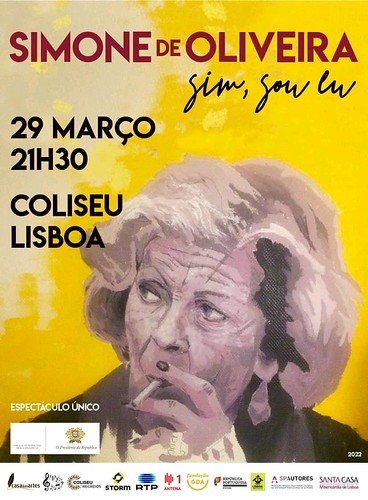
Portuguese card by Decca.

Portuguese advertisement. 19 March, Coliseu, Lisboa: Simone de Oliveira.
A surprise meeting
First, our memory of Simone de Oliveira. In July 2009, we spent a week in Lisbon. We stayed in a former cinema, the Eden, on the Avenida da Liberdade. The Eden was one of the grand movie palaces on the Avenida when classical Hollywood cinema ruled. The Eden closed in 1989, and in 1991 it was used as a location in Wim Wenders' film Until the End of the World. In 2001, the building was converted into a huge four-star hotel while retaining part of the original facade.
Every night we took an old tram up the hill to the Bairro Alto, where there are many old bars and restaurants. One day, someone suggested we visit a special restaurant that was frequented by many gays, lesbians, and other interesting people. When we arrived at the restaurant, the waiter told us that it was unfortunately full. We chatted a bit and told the waiter where we were coming from. The waiter smiled. He was a huge fan of the city of Amsterdam and said there might be a table next to the kitchen. That was fine with us. A table was cleared, and a few regulars kindly moved over. We ended up sitting next to an elegant older blonde, who was drinking a huge bubble of whiskey while chain-smoking.
It became a night to remember. The food was delicious, the wine was even better, and the company was excellent. We had a lot of fun with the waiter and the other guests. The waiter kept putting on unintelligible but beautiful music for us by a Portuguese singer. Sometimes it was cheerful, sometimes melancholic. At the end of the evening, I asked who the singer was. He showed me his CD of Simone and pointed at our neighbour. It was her! We applauded. The next day, I immediately bought her album 'Perfil'. When I showed it to a Portuguese friend and told her that we had met this lady the night before, our friend almost fainted. Simone is a true legend in Portugal, as big as Barbra Streisand in the US. Of course, we went looking for postcards of her. Fortunately, we were able to find one.
Simone de Macedo de Oliveira was born in 1938 in Lisbon, Portugal. Her father was Guy de Macedo de Oliveira, and her mother was Maria do Carmo Lopes da Silva. He was a descendant of an African King of São Tomé e Príncipe in the nineteenth-century Portuguese territory. Simone started singing in high school. When she was 19, she had a depression. Her doctor told her that she needed to find something to do. Simone decided to go to the Centro de Preparação de Artistas da Emissora Nacional (Artists Preparation Centre of National Emission).
The first time Simone sang in public was at the Festival da Canção Portuguesa (Portuguese Song Festival) in 1958. She placed third with the song 'Olhos nos Olhos' (Eyes in Eyes). In the following decade, she performed several times at the popular Festival da Canção Portuguesa. In 1965, she won the festival with the song 'Sol de Inverno' (Winter's Sun) and represented Portugal at the Eurovision Song Contest 1965.
Simone sings 'Sol de Inverno' at the Eurovision Song Contest 1965. Source: RTP (YouTube).
Important stage actress
Simone de Oliveira also became an important stage actress in Portugal. In 1962, she had made her theatre debut, and she appeared in plays like 'O Contrato' (The Contract), 'A menina Alice e o Inspector' (Miss Alice and the Inspector), 'A Tragédia da Rua das Flores' (The Tragedy of Flowers Street), and 'Conheci Miguel Torga' (I met Miguel Torga). A great popular success in Portugal was 'Passa por mim no Rossio'.
Another success was the homage to the singer Madalena Iglésias, who represented Portugal at the Eurovision Song Contest in 1966, in the musical play 'What happened to Madalena Iglésias?' in which Simone played the leading role. Simone reached the breaking point of her singing career in 1969 with the song 'Desfolhada portuguesa', with lyrics by José Carlos Ary dos Santos and music by Nuno Nazareth Fernandes. This song was a great success in Portugal, with innovative lyrics in Portugal at the time of the dictatorship of António de Oliveira Salazar. The song represented Portugal at the Eurovision Song Contest 1969 in Madrid. Despite its popularity in Portugal, this song was not successful at the ESC, getting only 4 votes.
After singing 'Desfolhada Portuguesa', she lost her voice for years. During these years, she worked in journalism, radio, and hosted TV shows. Simone returned to the stages in 1973, with a deeper, still potent, voice, and in 1979 she won the Festival da Nova Canção de Lisboa (New Song Lisbon Festival) with the song 'Sempre que tu vens é Primavera' (Every time you come it's Spring). She starred on stage and also appeared in four films: Canção da saudade (Henrique Campos, 1964), the action thriller Operação diamante (Pedro Martins, 1967), Cântico final (Manuel Guimarães, 1976) and the drama A estrangeira (João Mário Grilo, 1983) with Fernando Rey.
In 1987, she successfully fought breast cancer, and in 1997, she celebrated her 40 years of career. Simone also appeared regularly on television, where she hosted many shows and acted in soap operas like Tu e Eu (2006) and Vila Faia (2008-2009), and many other series. In 2009, Simone returned to the spotlight with a new album, 'Perfil', including 36 of her most memorable hits. At the Festival da Canção de 2010 (the 2010 Portuguese Song Contest), she once again performed 'Desfolhada', wearing the same dress she had worn 40 years before when she won the Festival in 1969. In 2011, at the XVI edition of the Golden Globes (Portugal), she received the Golden Globe of Merit and Excellence from Dr. Pinto Balsemão.
Simone de Oliveira was married twice: first to António José Coimbra Mano and later to actor Varela Silva. With her first husband, she had two children: Maria Eduarda and António Pedro. She has two ex-stepdaughters from Varela Silva’s first marriage (to Celeste Rodrigues, and she has two grandsons. In March 2021, Simone de Oliveira announced that she had decided to put an end to her career and would give one last performance. Finally, after a long delay due to Covid, that's possible, and today, 29 March 2022, Simone will perform and bid farewell. Thank you for your wonderful music, great diva!
Tribute to Simone de Oliveira at the Festival da Canção 2018. Source: EFestival da Canção (YouTube).
Sources: Nelson Costa (Oikotimes.com), Wikipedia (English and Portuguese), and IMDb.
No comments:
Post a Comment